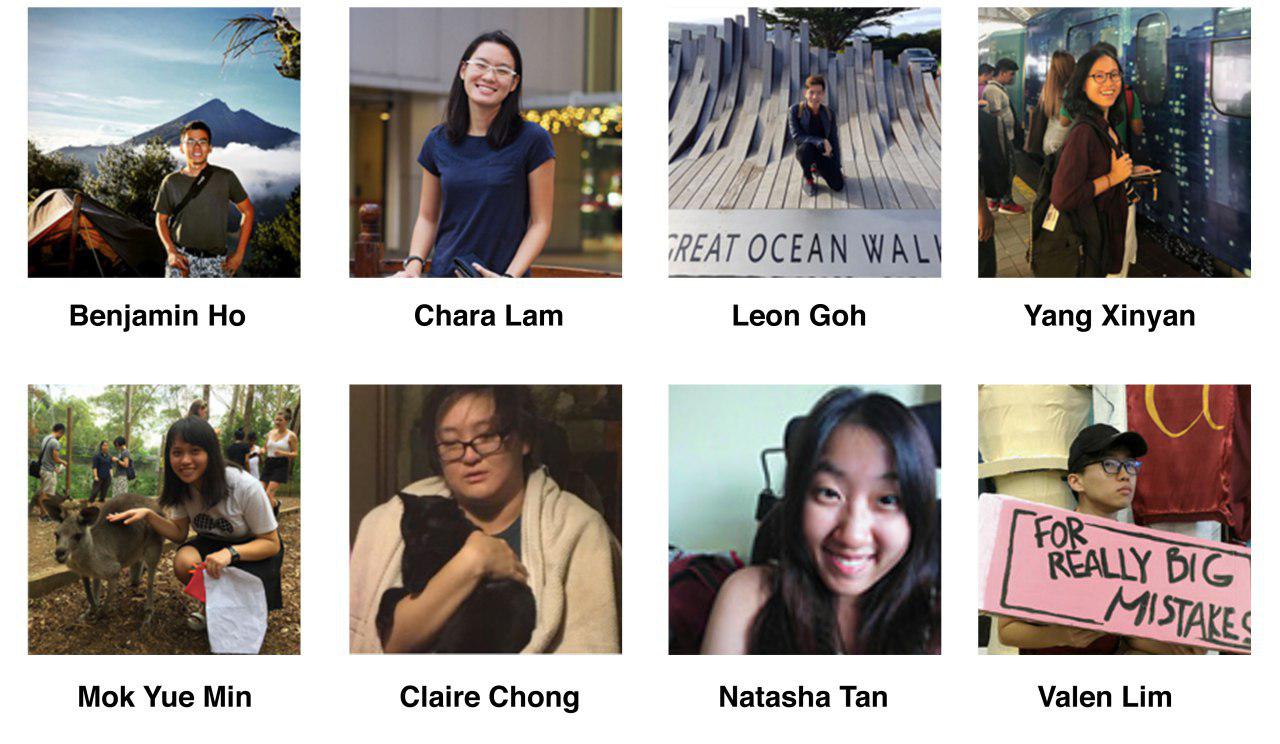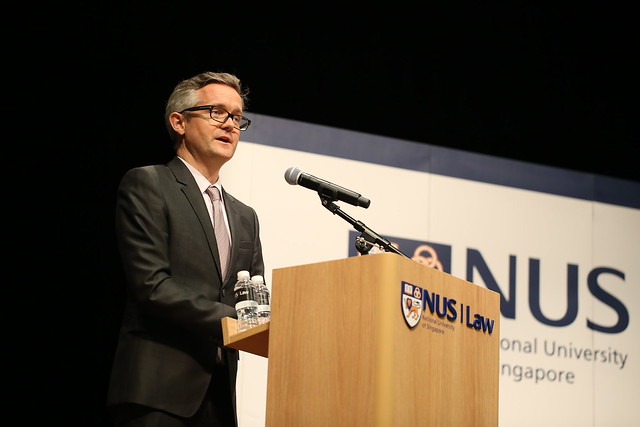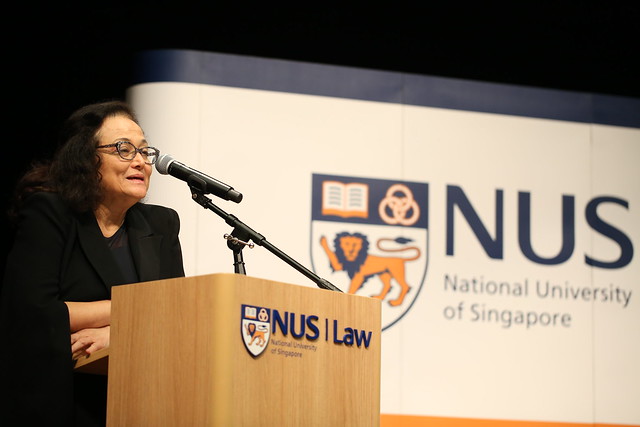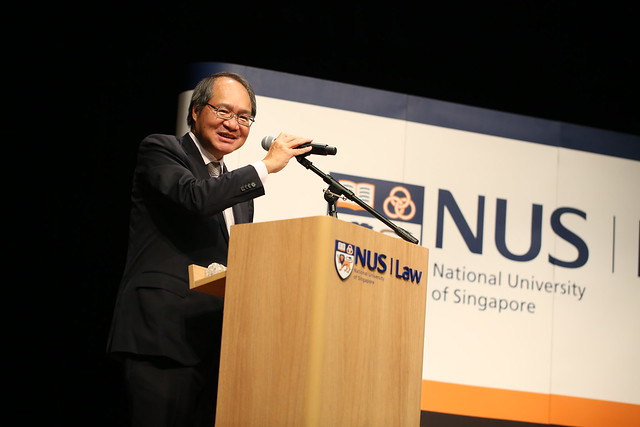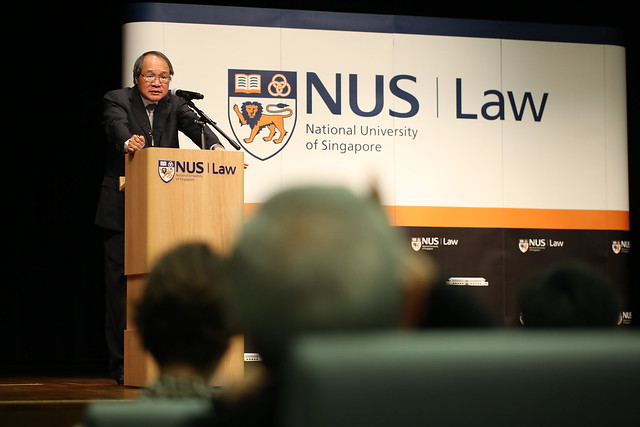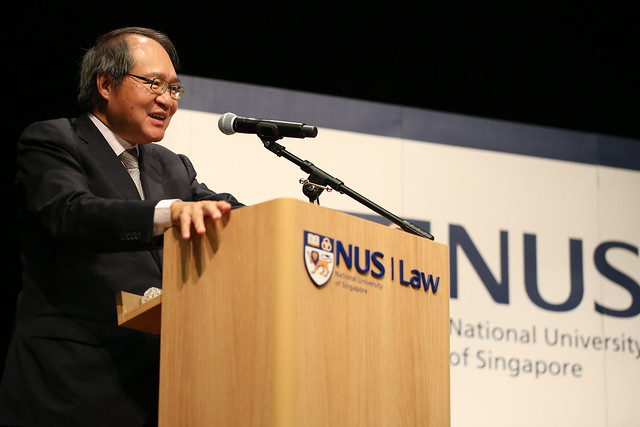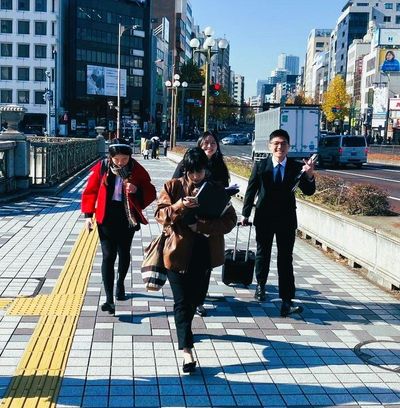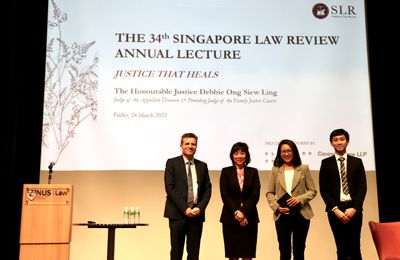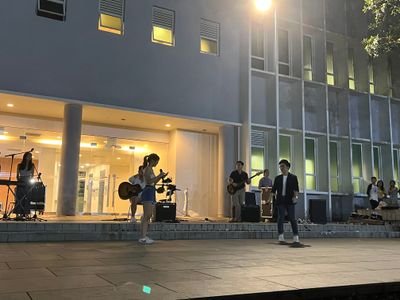Since its inception in 1984, the Singapore Law Review (SLR) Annual Lecture has been organised to further the SLR’s objectives of creating awareness of current legal issues and promoting legal thought and discussion amongst law students. Each lecture features a legal luminary on a topic of his or her choice, and is attended not only by law students, but also members of the Singapore Bench and Bar.
This year, for its 29th SLR Annual Lecture, SLR managed to get AG Lucien Wong, SC (Class of 1978), the 9th Attorney-General of Singapore to give a guest lecture on Prosecution in the Public Interest. Clearly, interest was high, with a record of over 300 sign-ups. The auditorium was packed with eager attendees, waiting excitedly for AG Lucien Wong SC to elucidate and explain what the AGC considers in practicing their prosecutorial discretion. Justified was interested, and fortunately, lucky enough to not just be able to make it into the talk, but also speak and mingle with various guests to see their thoughts on the matter.
Pre-Lecture Thoughts
With over 300 sign-ups for the Lecture, arguably every aspect of Singaporean society was represented that night. Ranging from the everyday layperson to foreign business partners, from law students to professors to judges, from the army, navy and the air force, many were interested in learning more about the exercise of prosecutorial discretion, straight from the Attorney-General himself. Furthermore, notable guests included the retired Honourable Justice Chao Hick Tin, Solicitor-General Kwek Mean Luck and various partners as well as senior counsels from established law firms.
Justified got the opportunity to interview various attendees before the lecture and ask them for their thoughts:
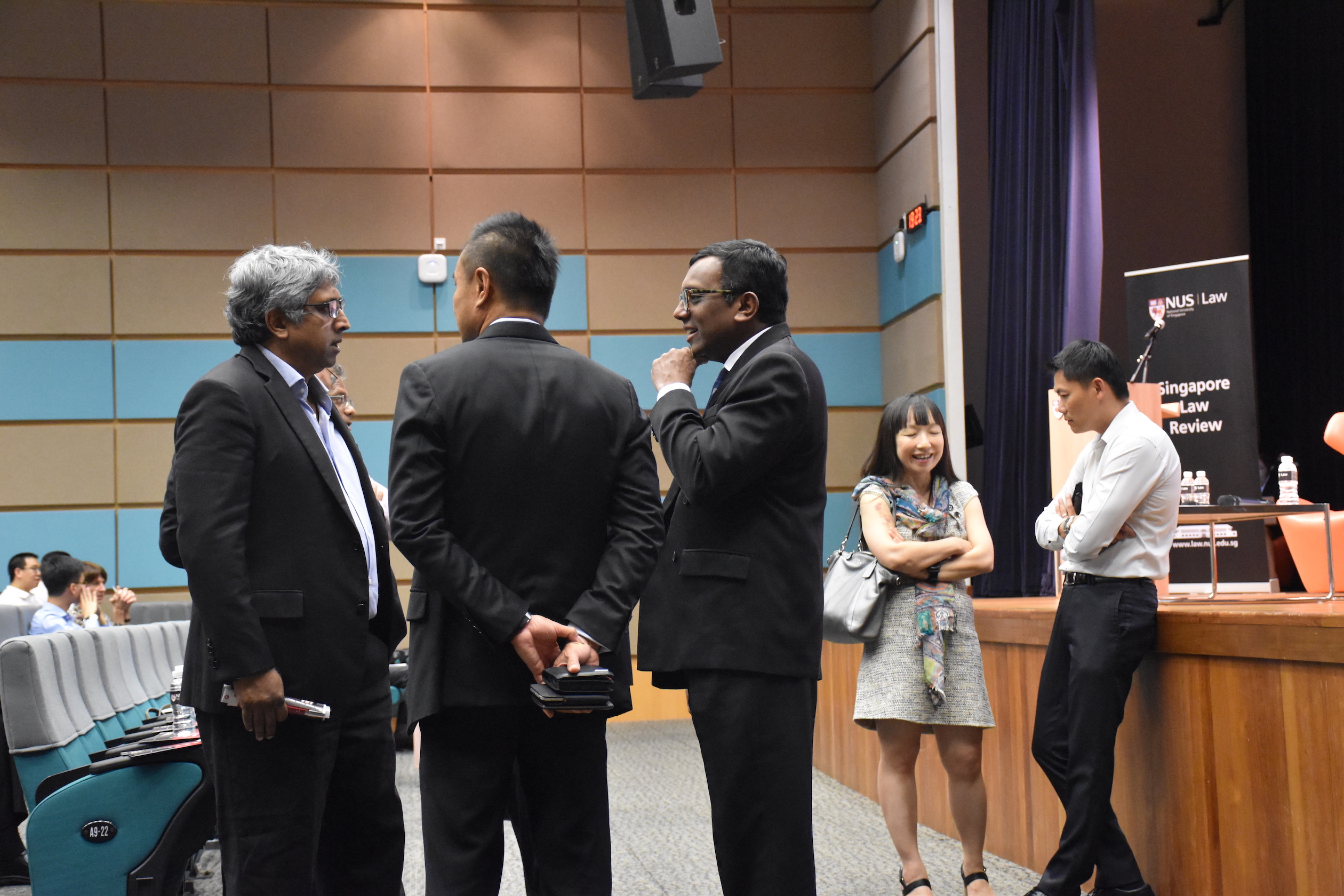
George, Member of the Public
“The topic of prosecutorial discretion is interesting to me and there are a lot of questions about it. I think the public should be more aware of our legal system. I don’t think it should be restricted to just the legal profession and every one who is interested should come and listen to talks like these, provided that they know about it.”
Professor Lim Lei Theng, NUS
“Public interest for pro bono lawyers is the way to go overseas when they try to fight for rights and everything, but we’ve taken a different path in Singapore, as far as pro bono is concerned since we work with the institutions, and its always been very good there, and very supportive. We work in the public interest, and it’s been interesting to hear from the Attorney-General himself, on his views on what the public interest is, and what litigation is in developing civil society, and people’s awareness of legal rights. To me it’s a sign of a robust legal system.”

Professor Alan Tan, NUS
“Regarding the prosecutorial discretion, there was a recent case of a duo who fatally assaulted a Frenchman at Orchard Towers, and the prosecution only charged for voluntarily causing grievous hurt even though the victim died. The newspaper does not reveal why the prosecution settled for a lesser charge, so my big general question for the Public Prosecutor is this: Whether more facts could be told to the public so that the public isn’t left hanging and questioning why the prosecution doesn’t seem to make sense. Even though there is confidentiality, I think at the end of the day they are still answerable to the public, and the public needs to have confidence as to the facts behind the decisions they made.
So I think that this is certainly an interesting topic, because we’ve not heard the present AG speak about what goes through his mind when, you know, having to make decisions on whether to prosecute or not. I’d say it’s very useful to hear his views, and to take them on board.”
Professor Michael Sturley, Visiting Professor, NUS
“I assume that prosecutors in Singapore must have discretion, because no system could work without it. You can’t simply prosecute every offence – just think about how often we violate speeding laws or jaywalking laws. Any system has its own prosecutorial discretion, the only question is how it is exercised. For the US, it became quite controversial when President Obama announced his decision to exercise his prosecutorial discretion in a particular way with respect to immigration matters.
This is, of course, not my specialty; nonetheless, I am curious to learn and I look forward to hearing the Attorney-General’s views.”
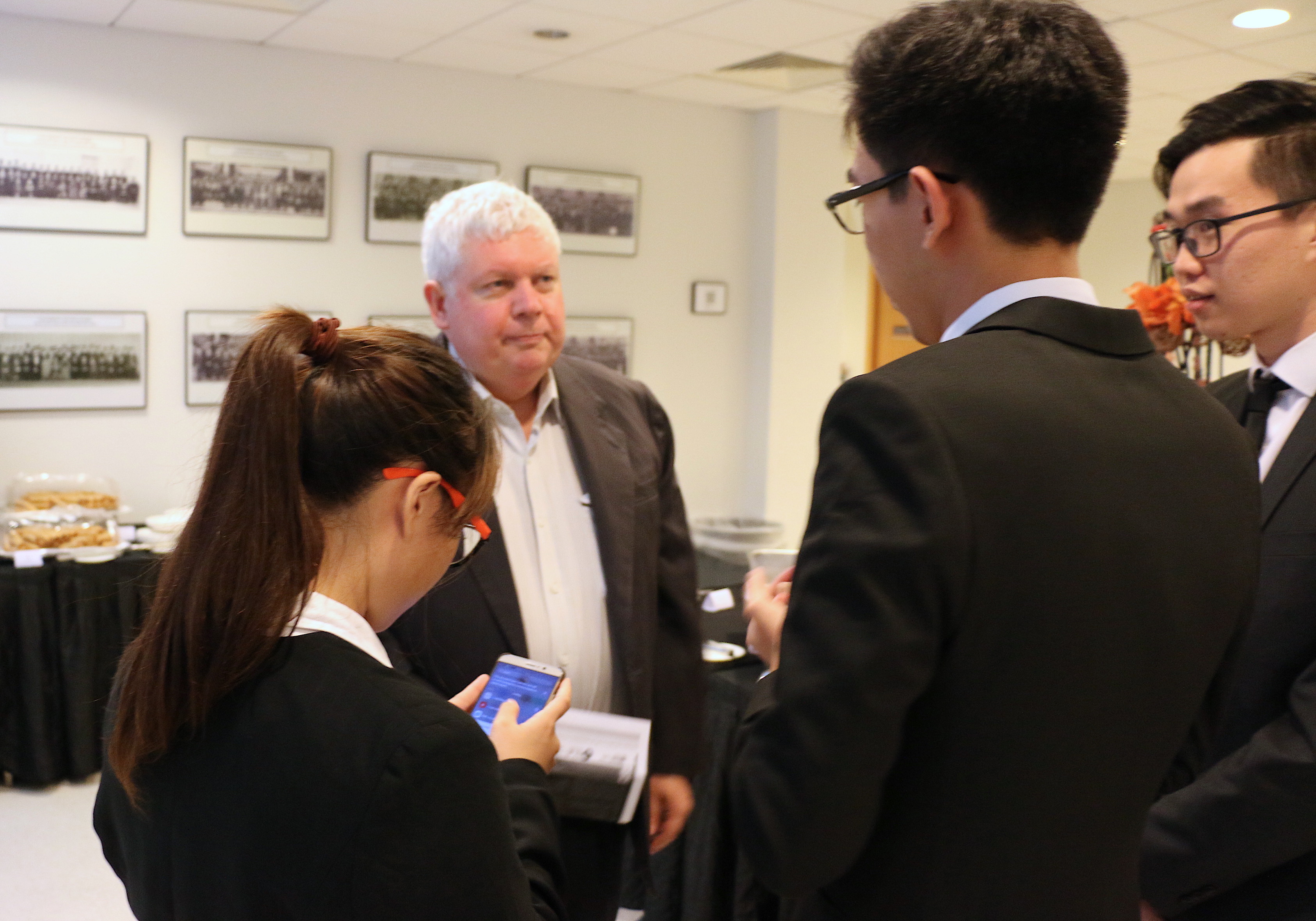
Mr. Bill Bowman, Senior Director of Infineon Technologies Asia Pacific Pte Ltd.
“I work for a German semi-conductor company, Infineon Technologies. I’m also an ex-SMU student, I’ve an LLM from SMU from years ago. Now, the topic is very interesting, prosecution in the public interest, so I’m looking forward to hearing from the speaker. I mean, at what point do you prosecute and how do you prosecute, and how do you balance up between the accused and the defence, and the public has an interest in prosecuting of serious offences, so how to balance it up? So, I am here to hear what the speaker has to say.”
Pang, Chan and Muslim, Practicing Lawyers
“I think [today’s talk about prosecutorial discretion] will be interesting. It’s a good opportunity for us to see for ourselves first hand what the new AG has to say. We are aware that he comes from a corporate background, and we want to see how it might have tempered the Attorney-General’s approach for the last few years under V.K. Rajah. It’s been very “prosecution aggressive” so far, for financial crimes, and so on. Whereas a new Attorney-General that comes from a corporate background may look at things differently, like how finances work, and how prosecution might affect Singapore as a financial hub.”
(For additional quotes, thoughts and interviews, we will be publishing them separately! Stay tuned!)
Opening Addresses
Once the event started, the opening addresses started promptly. Our emcee for the night, Suresh, brought us through the format of that night’s lecture, before handing the time over to May Ning, the Chief Editor of SLR. In her opening address, May Ning took the time to talk about the long and esteemed history of SLR, with it being entirely student-run, while thanking various parties such as Withers KhattarWong for their continuous support the past decade, the NUS Faculty of Law for supporting the event, and of course, the Attorney-General himself for helming the lecture.
Our Dean, Prof Simon Chesterman, then took the time to talk about the SLR itself, espousing it as a time-honoured platform for the development of legal scholarship, discussion in the legal fraternity and the honing of editing and writing skills. The Dean also took the time to praise SLR’s efforts to adapt itself to modern times, with its various branches and online advancements to make SLR more accessible, and sustainable.
Last but not least, Ms Deborah Barker SC (Class of 1976), Partner at sponsors Withers KhattarWong, rounded off the opening addresses. Reminiscing on the past where she used to be on the same debating team as our current Attorney-General (“once, and only once”), she also listed AG Lucien Wong SC’s long list of public service achievements, including being on the board of various public service organisations, as well as being a vital member of various committees, such as the Steering Committee for Review of the Companies Act. Noting the record number of people attending the Annual Lecture, Ms Deborah Parker SC went on to talk about how the topic of prosecutorial discretion has been gaining plenty of traction, even in the general public, before letting our Attorney-General take the stage for his maiden lecture as the newest Attorney-General of Singapore.
The Attorney-General’s Lecture
AG Lucien Wong SC addresses the attendees after the opening addresses.
AG Lucien Wong SC started off by bringing us through the difficulties behind the exercise of prosecutorial discretion. Being an abstract concept, people often disagree over what prosecutorial discretion exactly entails, and this disagreement only gets stronger when it comes to difficult cases. Nonetheless, the Attorney-General reiterated that public interest permeates all decisions made by the Attorney-General’s Chambers (AGC), and stressed that it was simply not possible to make a definitive, overarching statement – the exercise of prosecutorial discretion has to be assessed case by case. That being one of the reasons why the Public Prosecutor’s job is hard and demanding, often leads to robust, daily debates in the AGC – what is considered in the exercise of prosecutorial discretion?
As to the reason why prosecutorial discretion always involves the assessment of whether it is in public interest, AG Lucien Wong SC emphasised the various considerations that the AGC has to go through before even commencing prosecution. Amongst other considerations, first and foremost is whether the criminal offense is even disclosed – this being a factual and legal exercise, involving legal assessment of the case and delving deeply into possible offences, researching the elements to see if the offence can be proven. Subsequently – an issue of evidence: whether the evidence is reliable or sufficient, and whether there is a need to enlist the help of an investigative agency to help uncover further evidence. Last but not least, the AGC makes an assessment as to whether there is a reasonable prospect to get a conviction – then does the AGC consider the exercise of prosecutorial discretion. It would be a subversion of prosecutorial discretion to pursue prosecution in absence of a reasonable prospect of conviction.
After which, the AGC will then decide that it is committed to pursue prosecution with a reasonable prospect of conviction and consider how its prosecutorial discretion ought to be exercised. As not every individual who commits an offence needs to be charged (i.e. minor offences), not everyone who commits an offence should be automatically prosecuted. Minor offences may be visited with a warning, but may not necessarily result in prosecution. There are other mitigatory factors as well, i.e. first time offenders, or their age. Here is where considerations of public interest factor in – public interest helping to inform the exercise of prosecutorial discretion in three ways: firstly, who deserves to be charged?; secondly, which charges are appropriate; and thirdly, what sentence should be submitted? The objective of the prosecution is not just to punish – each prosecution is done with the public interest in mind.
Prosecution in The Public Interest
But what does it mean to prosecute in the public interest? AG Lucien Wong SC set out four guidelines for practicing prosecution in the public interest:
- Prosecutions conducted in name of the public
- Offences prosecuted for the good of the public
- Proceedings conducted according to values expected by the public
- Action is taken in the eye of the public
Prosecutions conducted in the name of the Public
Firstly, AG Lucien Wong SC spoke about the “two hats” he wore – first, as the chief legal advisor and representative of the government in both civil and judicial review proceedings; and second, as the Public Prosecutor, making independent decisions as to whether to charge individuals for criminal offences. Any interaction with the government, he emphasised, would be simply that of a solicitor and his client.
To prosecute in the name of the Public would also mean that prosecutions would not be brought to further private interests of the victim, but rather, to further public interest. To this end, AG Lucien Wong SC raised the example of cases of sexual abuse – would the prosecution stop if the victim withdraws his or her complaints, for example, upon being compensated by the abuser? The message is clear – the accused has offended values fundamental to Singaporeans, and not just to the victim.
Offences prosecuted for the good of the Public
With every decision having serious repercussions, the AGC needs to prosecute offences strictly for the good of the Public. Key considerations as to this end would involve promoting a culture where each of our rights are respected, as well as a culture where public institutions are strong. A few examples where these concerns are given effect include prosecution for contempt of court to protect the integrity of the judiciary and of others who may accuse the AGC unfairly and without proof. The AGC also considers larger policy objectives, such as environmental sustainability. Further, the legal officers of the AGC bear in mind that the public interest will evolve. They have appropriately pursued causes of action in cognizance of this: for instance, reflecting the rise in fake news and offences against vulnerable members of society, such as domestic workers, and the elderly. AG Lucien Wong SC stressed again the importance of taking a solution-centric approach so as to treat the root causes of criminal conduct and discourage re-offending, with many interests needing to be balanced in each case.
Proceedings conducted according to values expected by the Public
As the Attorney-General stressed, the public expects the highest standard from Public Prosecutors, as compared to private lawyers. Public Prosecutors are expected to deliver just outcomes in the eyes of the public – for instance, in their prosecutions of offences against vulnerable members of society such as sexual abuse of minors, or abuse against domestic workers. To this end, the AGC takes an even-handed approach, providing as much evidence as possible, even where it may possibly weaken their own case. On the other hand, AG Lucien Wong SC also took the time to acknowledge the efforts of the Law Society in increasing the ease of access to justice, with programmes to assist those who are charged such as Criminal Legal Aid Scheme (CLAS).
Action is taken in the eye of the Public
Last but not least, the Attorney-General stressed that prosecutions were open to valid public scrutiny. Transparency and publicity of prosecutions are to help align prosecutorial discretion with the good of the public and society at large. Nonetheless, AG Wong maintained that scrutiny would not detract from the Prosecutorial drive toward justice. Just as the AGC will not hesitate to respond to public interest for a tougher sentence, it will also be fair to the offender in pursuit of justice. An even-handed approach is taken, especially where there is any loss of life involved and mitigating factors come into play.
AG Lucien Wong SC concluded his maiden lecture by emphasising that the AGC will continue to prosecute in the public interest and for the good of Singapore. The exercise of prosecutorial discretion in Singapore is a multi-faceted task needing the balancing of multiple factors, with no one person determining what public interest is in the AGC. There will always be debate over the decisions that have to be made – but the final guarantor is the quality and integrity of the men and women entrusted with this crucial task. AG Lucien Wong SC then took the time to thank the AGC and its DPPs for being some of the most dedicated lawyers he has had the privilege to work with. Following which, the audience engaged in a robust and open Q&A, with the Attorney-General. (The Q&A was under the Chatham House Rules, and thus omitted from this coverage.)
Reflections
The Justified team had the following to say about the event:
Benjamin Ho (Y1)
The lecture was well received by its audience, who was keen to understand and learn more about prosecutorial discretion under the Attorney-General Lucien Wong SC who took office only earlier this year. Delivering the topic of “Prosecution In the Public Interest”, this was the first time the AG has publicly spoken about the broad objectives and purposes of the prosecution under his charge. It was most interesting to see the concepts of prosecution and sentencing consideration that we learn as freshmen in Criminal Law classes come to life with his elucidation on the role of the Public Prosecutor and its challenges.
Chara Lam (Y1)
The talk allowed me to get deeper insights into what the AG does, and how his role is actually so much more complex than what it seems. He gave us new perspectives into criminal litigation with respect to the public interest, and showed us the processes and considerations of the AGC. I enjoyed listening to the AG share, especially in the question and answers segment, where he was able to talk candidly about what he does, and share his opinions on various subjects with the audience.
Leon Goh (Y1)
The talk by AG Wong was definitely eye opening for me. For one, it was clear and concise yet it beautifully captured the nuances and fine balancing act done by the AGC on a daily basis. What was particularly interesting was how the AGC grapples with balancing multiple objectives like the public interest, punishment to achieve a just outcome for not just the victim, but also the offender.
Mok Yue Min (Y1)
AG Wong’s first lecture was extremely enlightening. Learning about how public interests affect prosecutorial discretion has broadened my perspective on this subject matter. His talk was especially helpful and informative for my understanding of criminal law, and I have gained a better understanding of how complex the work done by the AGC is. AG Wong did a wonderful job of breaking down this complex topic into simple pieces of information that was easily comprehended.
Valen Lim (Y2)
Having been in Professor Woon’s criminal law class, and therefore having the privilege to listen to two recent Attorney-General’s differing takes on prosecutorial discretion, it was a great learning experience to attend the lecture by AG Lucien Wong SC. I appreciated the way our current Attorney-General structured the various principles of prosecutorial discretion, framing them squarely in the interests of the public – true to the topic of the Annual Lecture. While the way the two explained the exercise of prosecutorial discretion seemed to differ greatly, ultimately, I found that the end-goal still remains a consideration of whether it would be fair and just. This, I found to be reassuring – it reinforces and reiterates the objective of the AGC to be guardians of Justice, with strong and infallible principles for the benefit of society at large. It emphasises the impartial nature of the law, despite how some many decry it to be unfair. And if anything else, as future officers of the court, it is good to learn more about the process behind our public legal institutions and the everlasting importance of being fair to all parties.
Likewise, I feel that the lecture really drove home the importance – and difficulty – of the office of Attorney-General. An Attorney-General is personally involved in so many difficult decisions – whether to prosecute, what to sentence et cetera- and being a central, recognisable public figure, is often open to criticism, rebuke and complaint. Just as AG Lucien Wong SC said – the considerations of the AGC, and by extension, the far-reaching roles of the Attorney-General, are simply not easy to settle in a lecture that’s an hour long. Regardless, the club and I remain thankful to have been able to be part of such a hallmark event.
Conclusion
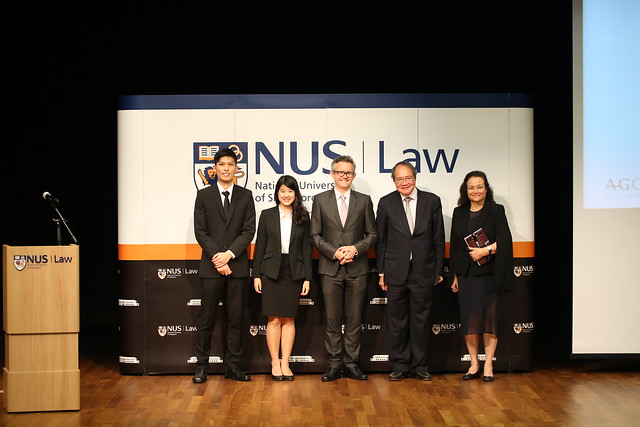
The Attorney-General takes a commemorative photo with the SLR Editorial Team, the Dean and Ms. Deborah Parker SC.
The SLR Annual Lecture was an eye-opening glimpse into the nature of the Attorney-General’s Chambers and their day-to-day operations. It showed the role of the Attorney-General, and by extension, his Public Prosecutors, to be ever-changing so as to keep up with the evolving public interest. Furthermore, the lecture really captures the spirit of the law – as a constantly evolving, growing entity, so as to best serve the people of Singapore. Justified is privileged to have been able to attend the event, and we hope to be able to attend similar events in the future. And many thanks to the SLR team who invited us to cover this event!
Written by:
